The industry is changing rapidly due to technology, a massive shortage of management talent as well as major trends in project delivery and geographic expansion.
Strategic decisions along with the operating rhythms and the feedback mechanisms that ensure execution are the most highly leveraged decisions in the business.
This is an area where an experienced 3rd party can add significant value. Find someone that resonates with your team and has experience relevant to your company. Change the facilitator every few years for fresh ideas. Unless they are really bad don’t change them every year so you have some continuity. You might consider overlapping facilitators having the outgoing facilitator sit in on your side of the table providing additional continuity.
Consider bringing in some of your key customers, vendors and subcontractors as part of your strategic planning process. Whatever you do; don’t underestimate the value of this process.

